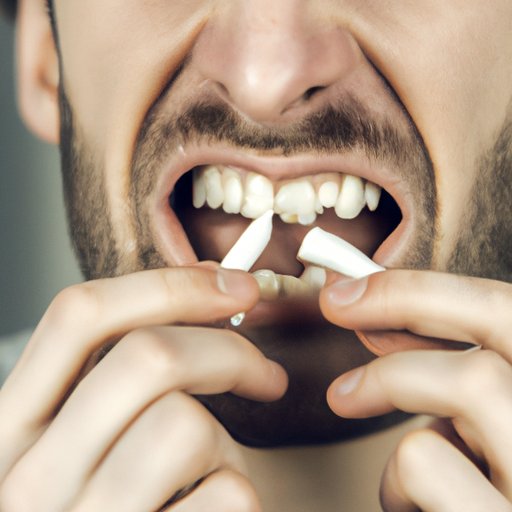
Introduction
One of the most common questions patients ask after wisdom teeth removal is whether they can smoke. Smoking can have a major impact on the healing process, so it’s important to discuss this topic with your dentist or oral surgeon. In this article, we’ll explore the do’s and don’ts of smoking after wisdom teeth removal, expert opinions and real-life stories of the negative consequences of smoking, the benefits of quitting smoking, alternatives to smoking, and the science behind smoking after wisdom teeth removal.
The Do’s and Don’ts of Smoking After Wisdom Teeth Removal: A Comprehensive Guide
Oral surgery can be a painful and risky procedure, so it’s important to follow your dentist or oral surgeon’s instructions for post-operative care. The healing process will depend on many factors, including the severity of the extraction and whether or not you smoke.
Smoking can have a major impact on the healing process, as nicotine and other toxins in cigarettes can decrease blood flow and delay the body’s natural healing responses. In general, it’s best to avoid smoking for as long as possible after wisdom teeth removal.
The following are some do’s and don’ts for smoking after wisdom teeth removal:
- Don’t smoke for at least 24 hours after surgery.
- Avoid smoking for as long as possible after surgery, ideally for one to two weeks.
- Don’t inhale the smoke deeply, as this can irritate the surgical site and increase the risk of infection.
- Don’t use a straw for at least one week, as the suction can dislodge the blood clot and delay healing.
- Do rinse your mouth with salt water after smoking to help reduce inflammation and prevent infection.
- Do follow your dentist or oral surgeon’s instructions for post-operative care and take any prescribed medication as directed.
Why Smoking After Wisdom Teeth Removal is a Bad Idea: Expert Opinions and Real-Life Stories
Smoking after wisdom teeth removal can have serious health consequences, including prolonged pain, swelling, bleeding, and infection. In fact, some experts recommend that patients quit smoking altogether before and after oral surgery to reduce the risk of complications.
Most dentists and oral surgeons will advise patients not to smoke for at least 24 hours after surgery, but some recommend avoiding smoking altogether for one to two weeks. This can be challenging for smokers, especially those who are addicted to nicotine.
Real-life stories of the negative consequences of smoking after wisdom teeth removal abound. Some patients report experiencing severe pain and swelling, bleeding that persists for days or weeks, and infections that require additional treatment.
Quitting Smoking for a Week: An Experiment to See How it Affects Your Healing After Wisdom Teeth Removal
To see how smoking affects the healing process after wisdom teeth removal, some patients have conducted experiments by quitting smoking for a week or more. The results of these experiments have been mixed, with some patients reporting faster healing times and others not noticing any difference.
The benefits of quitting smoking after wisdom teeth removal are clear, however. Quitting smoking can reduce the risk of infection, improve blood flow to the surgical site, and promote faster healing times. Patients who want to quit smoking should talk to their dentist or oral surgeon about the best ways to do so.
Alternatives to Smoking After Wisdom Teeth Removal: Tips and Tricks
For patients who can’t or don’t want to quit smoking altogether, there are some alternatives to smoking that can help reduce the risks and promote a healthier healing process.
Chewing gum and using nicotine patches can help reduce cravings and provide a healthier source of nicotine. Distractions and stress-relief techniques, such as deep breathing, yoga, or meditation, can also help reduce the urge to smoke. Support groups and counseling for quitting smoking can provide additional motivation and resources for patients who want to quit smoking for good.
The Science Behind Smoking After Wisdom Teeth Removal: Risks and Consequences Explained
The science behind smoking after wisdom teeth removal is clear: smoking can have serious health consequences and delay the healing process. Nicotine and other toxins in cigarettes can decrease blood flow and oxygen supply to the surgical site, impair the immune system, and increase the risk of infection.
Smoking can also increase the risk of dry socket, a painful condition that occurs when the blood clot in the surgical site is dislodged, exposing the underlying bone and nerves.
Conclusion
In conclusion, smoking after wisdom teeth removal is a bad idea. Patients should avoid smoking for as long as possible after surgery, ideally for one to two weeks. Quitting smoking can have major health benefits and promote a healthier healing process. Alternatives to smoking, such as chewing gum and using nicotine patches, can also help reduce the risks and promote a healthier healing process. By following your dentist or oral surgeon’s instructions for post-operative care and pursuing a healthier lifestyle, you can reduce the risk of complications and have a smoother recovery after wisdom teeth removal.





